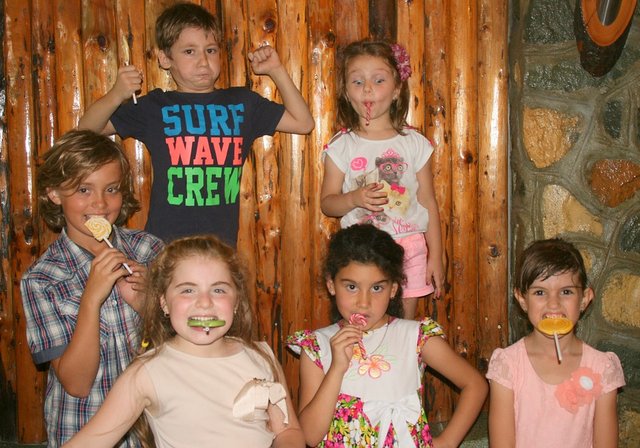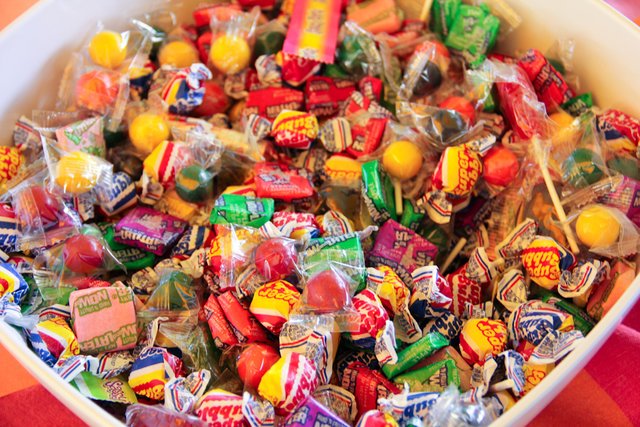Medical Myths: Does Sugar Really Make Kids Hyperactive?
Violence is wrong. You know it, I know it; it's a teaching that is instilled in us from an early age, and that generally stays with most of us, no matter how much we enjoy the street fights of Kimbo Slice on Youtube (rest in peace, you were too young). However, it is amazing how easy it is to forget this basic teaching when we are in the presence of a hyperactive child, the kind who is always screaming at the top of his lungs and never stops running, in what seems to be a social experiment designed to test our levels of patience.
These scenarios are especially common in that recreation of one of the circles of hell that we call "children's parties", where the amount of candy and sweets that kids eat makes them have a superhuman energy level, or at least, this is what everyone always says. And looking at the huge amount of empirical evidence, it seems quite reasonable. But is it true that the sugar they consume causes this hyperactivity? And if so, why?

Let's start with the basics: what does sugar do in our body?
The substance that we know as common sugar, whose real name is sucrose, is a type of carbohydrate (biomolecule composed of carbon, hydrogen and oxygen atoms) whose main function is to store energy that is then used to make our organism work. However, it does not fulfill this function when it is in its natural form: when it enters the body it is metabolized, decomposing in its two base monosaccharides (simple carbohydrates), glucose and fructose. These two molecules have their differences, but both have the same basic function of energy storage. Using logic, it makes sense to think that if a lot of sugar is consumed, a greater amount of energy enters the body, causing excesses that have to be released through physical efforts. But since the human body is such a complex machine (to the sorrow of us medical students), reality differs from this theory.
A great variety of studies have been made studying the relationship between sugar consumption and hyperactivity in children, and although a few has supposedly detected a small increase in the energy of the infants after consuming candies, the great majority of them agree that this is just another myth; eating sweets will not make your child become a demon with the only apparent desire to see you suffer, he was one already.
As an example, let's look at the study published in the New England Journal of Medicine, in which children of different ages were separated into two groups, and they were subjected to 3 different diets over 9 weeks: one high in sucrose and low in artificial sweeteners, another low in sucrose and using aspartame as a sweetener, and one last low in saccharose and using saccharin (an artificial sweetener that is not metabolized into glucose) as a placebo. The children were always kept under the care of their parents, and their physiological and psychological reactions to the diet were carefully examined.

Everyone related to the experiment; the test subjects, their families, and even the scientists, remained unaware of the sucrose content in the food. They were told that the amount of sugar in the meals would change weekly, when in fact the diet varied every 3 weeks. During the study, the behavior of both children and parents was analyzed, as well as blood sugar levels before and after meals. Upon completion, it was noted that not only there were no noticeable changes in children's behavior while receiving a high-sugar diet, but the slight differences found during these periods were more consistent with a calming effect than with hyperactivity. This is like believing that British people have bad dental hygiene, to later discover that they are in fact immune to the formation of cavities, and that their teeth are made of freaking vibranium.
But then, why does it seem that children never get tired during parties where they consume a lot of candy?
The answer to this lies in the psychology of the parents, rather than in the physiology of their children. In another study, two groups of infants were created; both were given the same amount of artificial sweeteners without sucrose, but in one of the groups the mothers were told that the children had ingested sugar, while in the other group the true nature of what they had consumed was revealed to them. It was then noted that mothers who believed that their children had consumed enough sugar as to bleed maple syrup insisted that the behavior of the infants was more hyperactive than normal, and tended to care for and criticize them more than usual.

Look at them, planning how to bring anguish and suffering to your life.
In summary, all children are prone to periods of hyperactivity, due to their greater energy reserves, and to the fact that they are yet to face the misfortunes of adult life. We may come to think that they are especially restless after eating candies, but we believe this because we have been erroneously taught that it is so. Of course, the uncontrolled consumption of sugar does have widely documented negative effects, such as obesity, the formation of cavities, and even the development of diabetes mellitus, but the only change in the behavior it produces is, ironically, in the parents, not in the kids. And consequently, children's parties will never be bearable even if you decide to eliminate all kinds of sweets from the menu, sorry.
References:
- Does Sugar Make Children Hyperactive?
- Wolraich, Mark L., Lindgren, Scott D., et al. Effects of Diets High in Sucrose or Aspartame on The Behavior and Cognitive Performance of Children, New England Journal of Medicine, 1994.
- Sugar Causes Hyperactivity in Kids: A Myth Persisting for Decades
Hello Mike, I am Quraturk and I just upvoted you. This is not an automatic comment. Welcome to steemit. Children are supposed to be active, they are the real scientist of this world. They ask very fundamental and interesting questions about world and try to understand the universe. They have so much energy to spend. With their little responsibility of course they will be more active during the day than us ^^. Quraturk is a new curation project aiming to support quality content creators. Each day we review hundreds of content that using #quraturk tag and select 5 of them to be upvoted. You can join us on the discord server.
This is an interesting perspective into sugar consumption. I hadn't really given much thought to the placebo affect that could occur. My concerns with sugar lie primarily with the fact that it has been found to affect bone and teeth. Nothing is for certain though which is why keeping an open mind is necessary nowadays. My kids have foods with sugar. it's unfortunately unavoidable.
I also think that some children are strong willed. But society wants us to keep them inside that box of 'well-behaved' models . We are too quick to put labels on our children, rather than understanding them.
Thanks for posting. :-)
A few years back I saw a documentary on this topic which showed a test being performed in a kindergarten. The results showed that sugar wasn't the main culprit,
Hello @mike961,
Air-Clinic sends her greeting!
We are happy that you are creating amazing medical contents on Steemit using the #Air-Clinic tag.
This article was found as a result of #Air-Curie Initiative! We encourage you to keep it up!
Expect an upvote from @Air-Clinic soon!
If you haven't joined us on Discord please do so by clicking here
Cheers!
@drqamranbashir- Air-Clinic Curator!